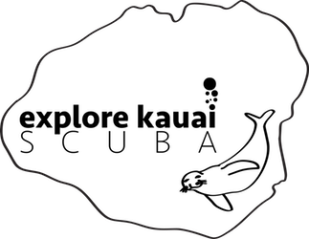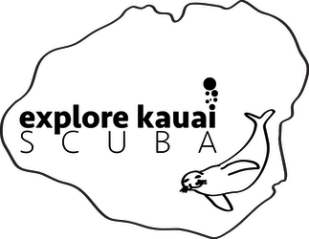We like to educate and encourage our visitors to volunteer and give back while on a tour with us! Pick up floating marine debris, remove fishing line from coral, and save seabirds with us! Also help identity individual animals like hawksbill sea turtles, whales, and manta rays.
Pick up marine debris – When we are crossing the Kaulakahi channel to Ni’ihau and Lehua crater we sometimes run in to marine debris. Help us pick the marine debris out of the ocean and bring it back to shore to dispose of properly! Often the debris will have many animals living on or around it. It’s sad because we feel like we are taking the animals home away from them but ultimately the marine debris is much worse for the marine animals. Learn how to identify the animals on the debris and help pick them off and place them back in to he ocean trash free!
Pick up marine debris while diving – Sometimes while diving we will trash or fishing line on the reefs. Help us pick it up and bring it back to shore!
Save Seabirds – Save downed fledgling seabirds off Na Pali and Ni’ihau! Over the years we have brought in many red-tailed tropicbirds, white-tailed tropicbirds, brown booby, red-footed booby, and wedge-tailed shearwater. If we find a grounded bird we can gently pick it up from behind with a towel, carefully wrapping the bird completely around its back, wings, and head. Then we will place it in a ventilated container in a quiet, shaded or cool location until we bring it to Save our Shearwaters. Save our shearwaters is the only Federal and State permitted facility on Kaua’i approved to rehabilitate native Hawaiian species.
Identifying individual marine animals – Identify individual animals with photo id to help scientists learn more about the animals here in Hawai’i. Each species has different ways to be identified individually. For example, Hawksbill sea turtles who are federally critically endangered can be identified by the plates on their face. When out on a tour with us you might get the opportunity to help identify hawksbill sea turtles, manta rays, whale sharks, hawaiian monk seals, humpback whales, fasle killer whales, pilot whales, rough-toothed dolphins, blainville’s beaked whales, bottlenose dolphin, and melon-headed whales.
Protecting your skin from the sun – While on a tour with us protect your skin from the sun without using chemicals that can get on the fragile coral reef. Some studies have showed that even fish and marine mammals are impacted by sunscreens and personal health products. Our favorite way to do this is with UV-protective clothing, sunglasses, and hats instead of sunscreen! We use Anetik sun hoodies for our sun protection but there are many other companies that sell UV-protective clothing. When scuba diving or snorkeling you want to be very conscious of the chemicals you put on your body before getting in the water. Limiting sunscreen use, using reef safe sunscreen, and choosing to cover the majority of your skin with lightweight UV-protective clothing before getting in the water is what we think is the best option!
Explore the Oceans – Come dive with us! Jacques Cousteau said, “People protect what they love.” If you already haven’t, we will make you fall in love with the ocean when you come dive with us!
Save Coral with good Buoyancy Control Practice good buoyancy control while diving our reefs on Kaua’i. Learn how to weight yourself correctly and practice good neutral buoyancy. Maintaining good neutral buoyancy while scuba diving is extremely important to not damaging reef and disturbing wildlife! We are here to answer any questions about this and give good pointers to those who are still dialing in this difficult skill!
Save the Ocean from Home!
Recycle – In Hawai’i you can recycle aluminum canned goods, cardboard, paper products, 1 and 2 number plastics. You can also get paid by recycling your CRV! Learn more about what you can recycle in your community!
Limit one time plastic use:
-Bring your own reusable shopping bag to the grocery store
-Use a thermos at a coffee shop
-Say no to plastic straws
-Say no to disposable plastic cutlery.
-When buying food choose paper over plastic whenever possible.
-Buy your food in bulk to reduce packaging waste.
-Pack your lunch in a reusable container.
-Instead of buying fast food, slow down, support a small business, and dine in
-Reusable hydro flasks instead of plastic water bottles.
-Cut down on disposable packaging and products.
-Instead of using plastic coffee pods just brew a pot of coffee!
-Buy in bulk and use cloth grocery bags
-Pack your snacks in reusable containers
-Put your coffee in a travel mug
-Carry a hydro flask instead of plastic water bottles. This will also keep your water cold!
All these choices are not only more environmentally friendly but also more cost-effective!
Compost – Composting helps reduce landfill waste and creates nutrient rich soil for your garden/plants
Choose sustainable seafood! Nick and I catch our own fish by spear gun or line and pole. We always follow Hawai’i Fishing Regulations.
If you live by the ocean, lake, river, or stream check our your states guidelines and catch your own fish! We understand that some people don’t live in places where they can catch their own fish! Monterey Bay Aquarium has a great seafood watcthprogram. You can use their seafood guides while shopping to choose environmentally sustainable options. Many of the fish we enjoy are in trouble due to destructive fishing and farming practices. You can make a difference for our ocean by making responsible seafood choices! Use the link below to find sustainable seafood!
https://www.seafoodwatch.org/recommendations/download-consumer-guides
Bring a reusable bag!
Hunt Invasive Animals- Nick and I hunt pigs, goats, deer, and sheep in Hawai’i. They all are destructive to the ecosystem. We buy minimal meat from the store and help decrease the population of feral animals on the island.
Here in Hawaii, feral pigs have been described as “death” to the native rainforest. They uproot native vegetation which allows non-native plants to invade. In addition, depressions are created in the soil from the uprooted vegetation which collect rainwater and create ideal breeding habitat for introduced mosquitos. These mosquitos spread lethal, non-native diseases such as avian malaria and avian pox to endangered birds. Hawai’i has some of the most amazing birds on the planet. Because of the isolation of our archipelago we are home to at least 34 species of birds that are found no where else on earth. Some of the endemic forest birds are only found on Kaua’i specifically and are heading for extinction because of the pigs. Feral pigs also help in the spread of non-native weeds by ingestion of the fruit with the seeds passing into their droppings. If you want to help get rid of some of the pigs on our island give Hunt Fish Kaua’i a call. If you live in Florida, Tennessee, Texas, or California their is feral pig hunting as well. It’s a great way to get meat and to help with the feral pig problem.
Check out your states hunting program to learn about ways to sustainably obtain meat, help get rid of invasive animals, or even help decrease populations of native animals who are over crowding the ecosystem and creating an inbalance.
Leave nothing behind –
As beach crowds increase, so does the amount of trash left behind or blown away. Don’t let your day outside contribute to the destruction of our oceans. Remember to leave nothing behind but your footprints — collect and dispose of your trash.

